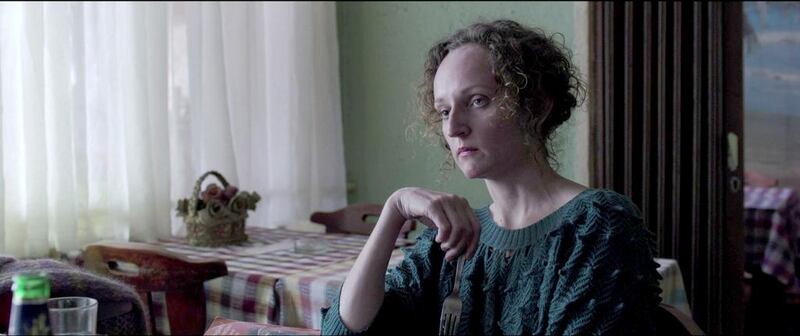The Sarajevo-born Jasmila Žbanic won the Golden Bear for best film at the Berlin Film Festival in 2006 – a feat made all the more impressive because her winning film Grbavica was her debut. Grbavica showed how a Bosnian Muslim mother tried to protect her daughter from learning about the true horror of war.
This was followed by 2010’s On the Path, in which Žbanic dealt with religion head on: a wife tries to adapt and cope when her husband decides that he should take Islam more seriously and joins a Wahhabi community.
Her third film, For Those Who Can Tell No Tales, which received financing from the Doha Film Institute, will be playing in competition at the San Sebastian Film Festival in Spain, which opens tomorrow.
It stars the Australian Kym Vercoe, playing herself, in the true story of how she discovered that the hotel she visited in Višegrad, Bosnia, on holiday was used to rape women during the Balkan war. The film is based on a theatre play that Vercoe wrote about her experiences. Earlier this month, it got a rapturous reception at the recently concluded Toronto International Film Festival, where The National spoke with Žbanic.
Did you see the theatre play?
I was in Sarajevo and friends asked me if I had seen this play, but I was not in Sarajevo when it was being performed. I was curious as everybody loved it and it’s very rare in Sarajevo for everyone to say they like something.
Why make the play into a film?
I got a DVD of the play. I was thinking about doing something to mark the 20th anniversary – anniversary is a very bad word – of the Balkan war. Then I saw Kym’s show and it contained exactly what I thought about my country. Two decades on from the war, and there is a lot of silence, a lot of denial.
Is this a companion piece to Grbavica?
Yes and no! In a very remote way, it’s dealing with a similar subject, violence against women, but I think the films are very different. This one is about somebody from the outside, Australia, coming to Bosnia and feeling with a sixth sense that something happened in a place she had visited.
How did you feel about returning to Višegrad?
I visited Višegrad as a child and until making this film had not been back. When we started doing research for the film, many people asked me not to go, because of my name and my first film, which created a fuss in that part of Bosnia. Grbavica was banned in the Serbian part of Bosnia.
How has Višegrad changed?
Before the war, 63 per cent of the population were Bosnian Muslims and now no one lives there. They have refugees from other parts replacing these people who have left Višegrad. They are not very happy living there – some of them we met and they helped on the film – they are Serbs from Sarajevo who are now in this little village thinking: “What am I doing here?” It looks like a black hole, unfortunately.
Is Islam important in your films?
I wouldn’t agree wholeheartedly. Of course, On the Path was just about that. In this film, it’s in the backdrop because it was Bosnian Muslims who were expelled. But I have the feeling that this story could have been about any religion or nationality and there would have been the same refusal to acknowledge what happened.
How do you feel about an Australian coming to Bosnia and being shocked by what she discovered?
For me, it’s wonderful because I believe in the universal values of humankind and for me, Kym’s reaction is just proof that we are the same and we can all sense similar things. In the end it’s just our culture, economies and tragedies that block us from having the same kind of responses, but our emotions and intuition are all the same. We all have love and fear that we can understand in the whole world and so for me it was logical to follow an Australian protagonist.
You are one of the few female directors to win a major film prize, the Golden Bear at Berlin. How did that affect your career?
It was very helpful. Coming from Bosnia, where the position of cinema is very weak in international cinema circles, the award was very helpful to get European funds and make films.
Why are you attracted to making difficult dramas?
I actually just finished shooting a film, Love Island, which is completely different. It’s somewhere between romantic comedy and drama.
Does making a comedy change your directorial approach?
Doing light and fun stuff is so different than researching murders and crimes and not being able to sleep at night. With a romantic comedy, your energy is different. I had a feeling working on Love Island that I liberated myself in many ways. I lived in Sarajevo during the war and after I did a lot of films that are connected with the war and suddenly making a romantic comedy, it was kind of liberating.
Is making a comedy a sign that Bosnia is finally moving on from war?
I think that in Bosnia there is a new energy coming. It’s like when you cut your finger, it always needs a little time to heal and that’s just your finger – can you imagine what it’s like to heal after living four years with no electricity and bombs every day and there is this fear in you? You need to get all this fear out and that is a process that takes time.
• The San Sebastian Film Festival begins tomorrow and continues until September 28. Visit www.sansebastianfestival.com for details
artslife@thenational.ae











